|
|
|
Sort Order |
|
|
|
Items / Page
|
|
|
|
|
|
|
| Srl | Item |
| 1 |
ID:
078940
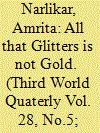

|
|
|
|
|
| Publication |
2007.
|
| Summary/Abstract |
Recent years have seen a plethora of writings - by scholars, journalists and policy makers alike - on India's rise to power. This paper argues that this much-vaunted rise needs to be viewed with caution. It examines the case for India's rise, and operationalises its growing influence by applying and further developing the concept of 'veto-player'. It highlights ways in which India has indeed acquired the status of a de facto veto-player in international relations. But the paper then presents three sets of reasons for caution. First, even though India's rise to power might appear dramatic and sudden, it is a product of a long and incremental process. This has policy implications: not all the policies of the preceding era should be carelessly abandoned by India or by other developing countries in similar circumstances. Second, there are still significant hurdles - many of which are domestic - that it must overcome if it is to fully realise its potential and acquire the status of a great power. Third, India may have acquired effective veto-player status in certain crucial negotiations, but this does not automatically translate into an ability to achieve preferred outcomes. Having examined the hurdles that India faces on its pathway to power, the paper goes on to suggest strategies that could be adopted to convert veto-player status into positive influence.
|
|
|
|
|
|
|
|
|
|
|
|
|
|
|
|
| 2 |
ID:
135675
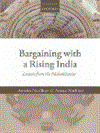

|
|
|
|
|
| Publication |
Oxford, Oxford University Press, 2014.
|
| Description |
238p.Hbk
|
| Contents |
Includes bibliographical references and index
|
| Standard Number |
9780199698387
|
|
|
|
|
|
|
|
|
|
|
|
Copies: C:1/I:0,R:0,Q:0
Circulation
| Accession# | Call# | Current Location | Status | Policy | Location |
| 058065 | 337.54/NAR 058065 | Main | On Shelf | General | |
|
|
|
|
| 3 |
ID:
135057
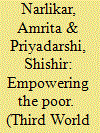

|
|
|
|
|
| Summary/Abstract |
After over a decade of languishing in stalemate, the Doha Development Agenda – the first round of trade negotiations launched under the auspices of the World Trade Organization – finally achieved a breakthrough at the Bali ministerial in 2013. Given that the Doha mandate places development – and particularly the concerns of the Least Developed Countries (ldcs) – at the heart of its agenda, our paper focuses on what the Bali outcome means for the world’s poorest countries. As a first step we provide a brief background against which the Bali negotiations took place. In the second section we assess the achievements and limitations of the Bali outcome, focusing on the ldc-specific package and also commenting on other issues that affect the ldcs. In the third section we explain the reasons for some of the achievements at Bali, which include negotiating strategies used by the ldcs themselves. In the fourth and final section we identify a plan of action for the future.
|
|
|
|
|
|
|
|
|
|
|
|
|
|
|
|
| 4 |
ID:
112088
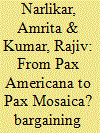

|
|
|
|
|
| Publication |
2012.
|
| Summary/Abstract |
While the economic rise of new powers, frequently identified as the 'BRICs' (Brazil, Russia, India, and China), has been dramatic, the implications of this emerging multipolarity for global economic governance are not clear. In this paper, we address the question: can the diffusion of power among a greater diversity of countries result in the creation of a new global economic order-a Pax Mosaica-to succeed the Pax Americana of the previous century? Our argument proceeds in four steps. First, we provide a brief overview of the achievements and limitations of the system that was established at the end of World War II, and lasted for over half a century in the form of Pax Americana. In the second section, we investigate the emergence of multipolarity, and highlight the opportunities and costs that this generates. In the third section, we explore the routes whereby the changing balance of power might be harnessed towards the creation of a Pax Mosaica. We do so by posing four sets of questions, which must be answered if the mosaic distribution of power is to lead to greater economic stability, growth, and peace. The fourth section concludes the paper with ideas for reform with reference to the World Trade Organization, the Bretton Woods institutions, and the G20.
|
|
|
|
|
|
|
|
|
|
|
|
|
|
|
|
| 5 |
ID:
187645
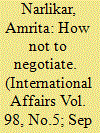

|
|
|
|
|
| Summary/Abstract |
Trade multilateralism would not have featured as a case of ‘abject failure’ had this special issue been planned in 2001. But since then, the World Trade Organization (WTO) has unfortunately become an almost perfect example of how not to negotiate, even when one takes into account the limited successes of the 12th ministerial conference in June 2022. This article proceeds in four steps. The first section outlines the multiple levels of malfunction and breakdown in the organization. The second part argues that a variety of negotiation failures are responsible for the dire straits in which the WTO finds itself today. I identify three broad categories of bargaining failures in this member-driven organization: negotiation mishaps that have led to the Doha deadlocks; negotiation muddles that members have got themselves into while updating the institutional practices of the WTO; and failures on the part of the membership to find negotiated solutions to new systemic challenges. The third section reflects on the interaction of my own research with the world of policy. The fourth and concluding section presents the main ‘Dos’ and ‘Don'ts’ that follow from the analysis, and offers some further policy recommendations.
|
|
|
|
|
|
|
|
|
|
|
|
|
|
|
|
| 6 |
ID:
120537
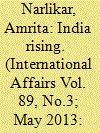

|
|
|
|
|
| Publication |
2013.
|
| Summary/Abstract |
This article investigates India's negotiation behaviour as a rising power and aims to help in the mediation of a polarized scholarly debate that either sees India as a 'natural ally' of the West, or as an unreformed and revisionist Third Worldist power. It argues that the key to understanding India's negotiation behaviour lies in examining with whom it is negotiating.
Rising India, even though it has a closer relationship with the West today than it has for many years, remains a negotiating partner that resorts frequently to distributive negotiation strategies, uses moralistic framing and resists bandwagoning. Its relations with the rising powers, too, reveal some degree of distributive bargaining, and it plays hardball with multinational companies and within international organizations.
Interestingly, and in contrast to its dominant bargaining behaviour with these different players, India's pattern of behaviour is different when dealing with smaller players. Here, it has consistently used integrative bargaining strategies, formed southern coalitions and shown willingness to share the burdens of international responsibility.
The differences in behaviour suggest that India is perhaps not reluctant to be a responsible power per se, but that it sees itself as owing its responsibility to different constituencies. The conceptualization of these responsibilities is still evolving, opening up some space for negotiation and influence for India and its negotiating partners, with regard to which the article offers some policy recommendations.
|
|
|
|
|
|
|
|
|
|
|
|
|
|
|
|
| 7 |
ID:
153835
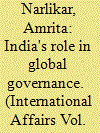

|
|
|
|
|
| Summary/Abstract |
India has for long been accused of having a nay-saying attitude in global governance. In this article, I assess the potential for change under Prime Minister Narendra Modi's leadership. The first section provides a brief overview of India's record in global governance. In the second section, I analyse the mechanisms whereby India may now become more able and willing to take on global responsibilities. In the third section, I investigate whether this more positive approach to global governance has in fact been borne out in reality. I do so by comparing trends in India's negotiation behaviour across two issue-areas: climate change mitigation and multilateral trade. The two cases are interesting because both deal with difficult multilateral deadlocks. India, moreover, has historically attracted a considerable share of the blame for the recurrence of these deadlocks. I find that although India's negotiating behaviour in the two cases shows some important differences of degree, there seems to be a qualitative and positive change in both in the same direction under the present political leadership. In trade, India has become considerably less obstructionist than before; in climate change it has adopted a dramatically proactive, value-creating and agenda-setting role. The fourth section highlights the risks and challenges that could still derail India's evolving role in global governance. The risks are serious, but the article still finds enough evidence to conclude on a note of cautious optimism.
|
|
|
|
|
|
|
|
|
|
|
|
|
|
|
|
| 8 |
ID:
108098
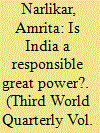

|
|
|
|
|
| Publication |
2011.
|
| Summary/Abstract |
To what extent does rising responsibility accompany rising power in international relations? This article focuses on India to address the question: is a responsible great power in the making? Following a brief theoretical discussion on the notion of responsibility and its relationship to rising power, the article offers an empirical overview of India's achievements thus far, and also the international and domestic challenges that it faces today. It argues that despite the attempts by observers to thrust greatness upon India, the country is yet to achieve greatness. The article further illustrates that India's record of assuming global responsibility has been lacklustre at best. A central argument of the article is that India's reluctance to share the burden of providing global public goods is inseparably bound with the nature of its rise to power.
|
|
|
|
|
|
|
|
|
|
|
|
|
|
|
|
| 9 |
ID:
127587
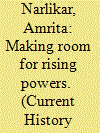

|
|
|
|
|
| Publication |
2014.
|
| Summary/Abstract |
In 2003, the investment firm Goldman Sachs predicted that, within less than 40 years, the economies of the so-called "BRIC" nations- Brazil, Russia, India, and China-could together exceed the output of America, Japan, Britain, Germany, France, and Italy combined, in US dollar terms. Since then, considerable hype has surrounded the BRIC phenomenon. Growth projections vary, and disputes have erupted between those claiming that the emerging markets will remain the powerhouses of the world and others pointing to a recent economic slowdown even in these countries. Arguments continue even about the category itself. Were the original BRIC countries right to expand their grouping to South Africa (creating the current BRICS)? Does Russia really deserve to be in it?
|
|
|
|
|
|
|
|
|
|
|
|
|
|
|
|
| 10 |
ID:
120535
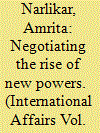

|
|
|
|
|
| Publication |
2013.
|
| Summary/Abstract |
The purpose of this special issue is to analyse the negotiation of power transition in the international system today. This introductory article provides the theoretical frame that guided all the contributors, and serves as the collective starting point for this project.
The framework focuses on three sets of issues. First, it highlights the importance of studying the relations between the key actors, rather than focusing solely on the perspective of any one group of players. It identifies five sets of key actors: the rising powers, the established powers, small and marginalized states, private actors (that attempt to harness the ongoing changes to their advantage and are in turn used by various state actors), and, finally, international organizations and other mechanisms of global governance (as loci, objects and also facilitators of international bargaining).
Second, the article facilitates an analysis of the relations between these actors; it offers the lens of negotiation analysis that focuses specifically on the variables of negotiation strategy, coalitions and framing.
Third, the article suggests potential implications of this collective study. These include new insights into the motivations of the key players, their ability and willingness to assume the responsibilities of international leadership, and how their visions of global order conflict with or reinforce each other.
The latter part of the article offers a summary of the findings, suggests how the individual contributions add up and presents some policy recommendations resulting from the analysis.
|
|
|
|
|
|
|
|
|
|
|
|
|
|
|
|
| 11 |
ID:
096251
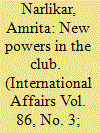

|
|
|
|
|
| Publication |
2010.
|
| Summary/Abstract |
No good deed goes unpunished: the WTO's timely response to accommodate the new powers-Brazil, India and China-at the heart of its decision-making has produced new inefficiencies, has heightened its proclivity to deadlock, and has exacerbated disengagement and disillusionment among all its stakeholders. Particularly in the context of a major economic crisis, a reliable international institution is necessary to ensure the continued provision of freer trade-well-recognized as the route to recovery. With the WTO's recent record to provide these necessary public goods under doubt, where do the solutions lie? This article discusses the changing role of the new powers in the WTO, and further analyses the opportunities and challenges that these developments generate. The concluding section examines possible routes to reform. While very little can, or indeed should, be done to alter the balance of power itself, it is argued that appropriate institutional reform can help the multilateral trading system retain the advances it has made on grounds of fairness and further address the concerns of efficiency that are central to the crisis that it faces today.
|
|
|
|
|
|
|
|
|
|
|
|
|
|
|
|
| 12 |
ID:
068632
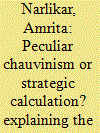

|
|
|
|
|
|
|
|